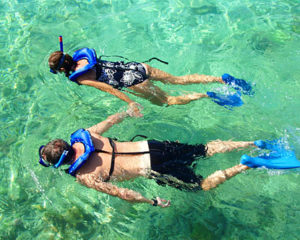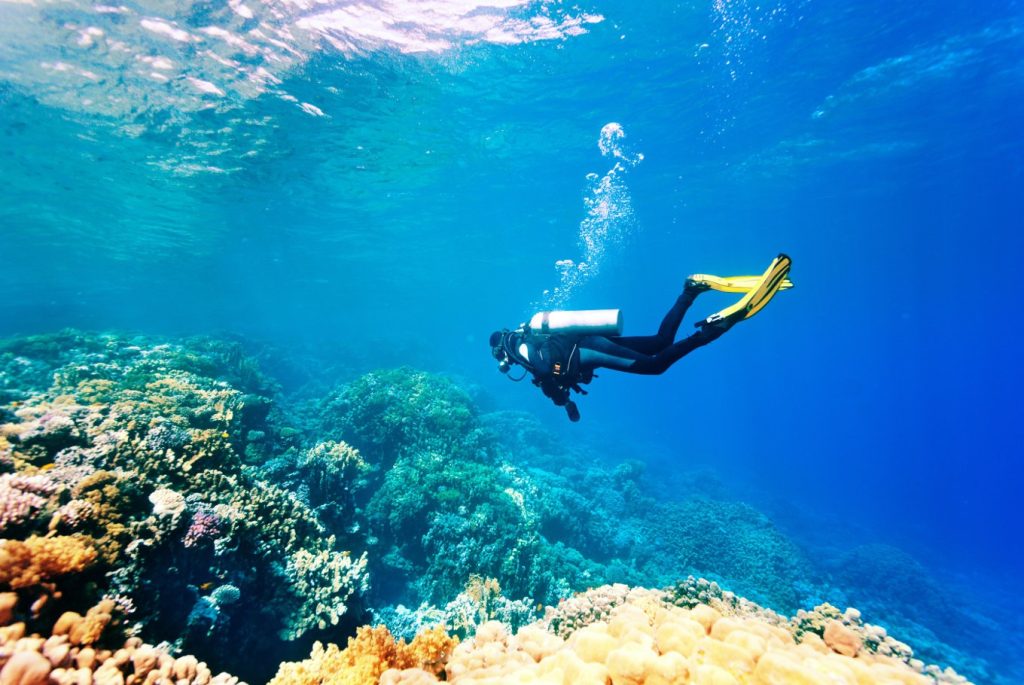Deep-sea diving, snorkeling, and scuba diving are three of the most popular and known underwater activities They make you explore the great depths of the ocean and acknowledge the wide variety of marine life, corals, and other treasures of the ocean holds. However, all three of these diving methods are very different and differ greatly in the ways they allow to dive in the ocean to admire the beauty of water.

Deep-sea Diving
Deep-sea diving requires specialized training from a diving professional as it allows you to dive beyond 40 meters. Any dive from 18 to 30 meters is considered a “deep dive”. Deep diving is a form of technical diving and requires training from a certified professional. Before you go deep into the ocean to discover the depths of it, your skills and of course your equipment both must be adaptable in the environment down there.
Training to be a deep diver requires two days of your time. In the training, you will learn how to extend your maximum depth to dive deep (40 meters) diving techniques, how to manage nitrogen narcosis, and most importantly what to do when something unusual happens. When it comes to scuba diving, you are going to require basic training and basic equipment. Your equipment must have a suit, a mask, a tank, and a diving computer. There may be some circumstances where your trainer may tell you that you need advanced equipment. It’s also important to recognize that diving isn’t an activity that is cheap when it comes to expenses, you don’t have to buy the expensive range gear every time you go diving while on a vacation, but your safety should come first, so be sure that you’re investing or at least renting the right equipment for your dive.

There is a lot of experience which you will gain in scuba diving. First of all, you will explore the depths of the ocean which other underwater activities don’t allow. At times the best things to see underwater are at deeper depths and deep-diving helps you experience it for yourself. It also lets you enjoy the quiet of the deep with only your regulator sounds and the low bubble sounds to break the silence. When you are in the deep you explore unique and unusual dive sites. Your trainer takes you to the depths and lets you enjoy experiences that cannot be accomplished in water that are shallow.
Places you can try out for Deep Sea Diving:
The Yongala, Australia
Thistlegorm, Egyptian Red Sea
Shark and Yolanda Reef, Egyptian Red Sea
Manta Ray Night Dive, Kailua Kona, Hawaii
Great Blue Hole, Belize
USAT Liberty, Bali, Indonesia
Richelieu Rock, Thailand
Navy Pier, Western Australia

Snorkeling
Snorkeling is a type of underwater activity where you explore the ocean from the surface using a mask and a breathing tube Type of activity makes you observe marine plants, coral reefs, and fish from just beneath the water’s surface so you can see them up close. Most people tend to enjoy snorkeling as a recreational sport as most people don’t have that much time to learn deep-sea driving from scratch, their vacation is short. Snorkeling is something you can learn within minutes and admire the beauty which it has to offer. All you need is to be familiar with how to use the mask, snorkel, and fins.

A few essential pieces of equipment are necessary snorkeling requires a dive mask that covers your eyes and nose with either an L or J-shaped breathing tube. This type of mask doesn’t allow water in your eyes and prevents going up your nose, while the snorkel allows you to keep your face underwater while still being able to breathe properly. A person of any age group can enjoy this activity also this is fun for the family and safe for the kids. Prevents rheumatism and is good for your heart. Snorkeling provides excellent fitness benefits and can help ease symptoms of rheumatic disease. What’s more, it has been known to strengthen the heart muscle. The best part is it helps in your breathing as you learn to control your breath and is a great stress buster as this activity helps in releasing stress through breathing.
Unlike Deep Sea Diving where you have to hire a trainer, snorkeling is not that expensive in comparison once you have the equipment, you’re ready to go.
Places you can try out for Snorkelling
Great Barrier Reef, Australia
Komodo National Park, Indonesia
Devil’s Crown, Galápagos
Grenada, The Caribbean
Bay of Donsol, The Philippines
Baa Atoll, Maldives
Madang, Papua New Guinea
Maui, Hawaii, United States

Scuba diving
Scuba diving allows a diver to explore at much greater depths. In Scuba diving a self-contained underwater breathing supply is present so that the person can be completely independent of the water’s surface and breathe underwater as they go deep and explore the depths. Scuba diving gives the pleasure of exploring shipwrecks, underwater caves, and seeing fish up close in their natural habitat. However, it isn’t just a hobby and there are many people for whom scuba diving is used professionally in their jobs; including offshore construction, military diving operations, and underwater welding. They may sound thrilling but there is also a lot of risks involved when you have such kind of jobs.
Learning to scuba dive requires a lot more training as it demands to stay under the water for longer and use the breathing equipment correctly. Scuba diving training helps in teaching the correct safety procedures and techniques, allowing you to enjoy underwater diving and exploration safely.

Scuba diving requires a lot more equipment including a well-fitting dive mask, a pressurized gas tank, a wetsuit or drysuit, swim fins, and a scuba regulator. You need the right scuba gear to enjoy your dive experience. Coming to the benefit Scuba diving is very beneficial for breathing as in the training they teach you how to breathe slowly, control and stabilize your breathing, many people who suffer from asthma find this exercise extremely helpful and beneficial. Scuba diving is a great anti-stress activity as it requires calm breathing, and this helps you gain more mental balance and release your stress out.
Places you can try out for Scuba Diving:
Silver Bank, Dominican Republic
Bora Bora, French Polynesia
Isla del Cocos, Costa Rica
Los Cabos, Mexico
St. Kitts, The Caribbean
Isla Holbox, Mexico

Although all three are popular recreational activities, with the main goal being to observe the natural wonders of the sea, the biggest difference between them is their exploring opportunities. You can enjoy the colorful marine life and vibrant reefs submerged in the shallows from the surface of the water or dive far deeper and stay underwater significantly for longer periods and explore.
Deep diving allows for the deepest exploration out of the three diving styles we’ve compared, so requires a whole new skill level from divers. Deep diving allows for exploration to be enjoyed at completely new depths for divers keen to explore as much of the ocean as they can.
Now that we’ve compared deep-sea diving, snorkeling, and scuba diving, the question is not which option is best but rather which is best for your purpose. You should have a pretty good idea of what you can do at your current skill level, what you’ll need to do depending on your reason for going underwater, and whether you need to do any further training. Whichever dive option you choose, always be sure to prioritize your safety so that you can make the most out of the experience.

